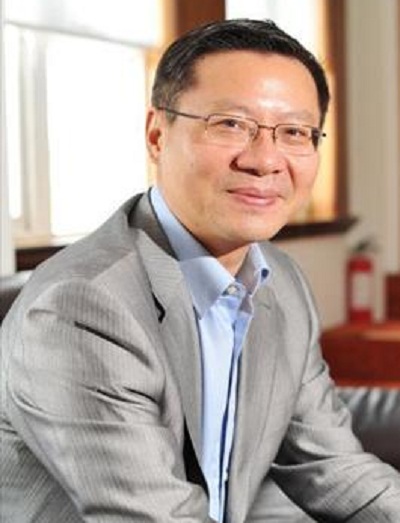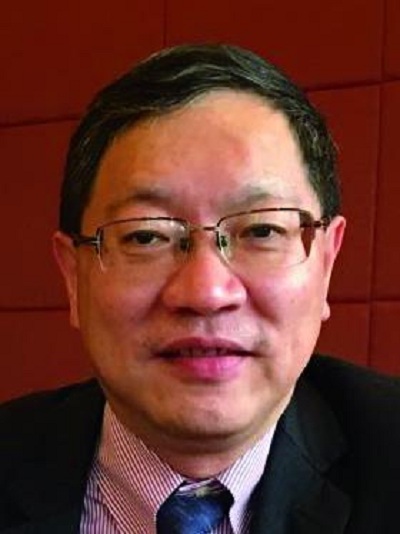|
||||||||||
| Home Nation World Business Opinion Lifestyle ChinAfrica Multimedia Columnists Documents Special Reports |
|
||||||||||
| Home Nation World Business Opinion Lifestyle ChinAfrica Multimedia Columnists Documents Special Reports |
| Opinion |
| Greater Vision |
| | VOL.9 November 2017 ·2017-10-31 |

The Communist Party of China (CPC) draws its strength from the people, who fought alongside it to achieve national independence and helped it win the domestic war against the Kuomintang.
Nonetheless, the CPC had, at one point, lost its course due to misjudgments and miscalculations, resulting in tragic outcomes such as the "cultural revolution" (1966-76) or implementing policies that disparaged trade and commerce, causing a loss of economic dynamism.
Realizing its mistakes, the CPC readjusted its policies, led China out of poverty, and achieved an economic miracle that surprised the whole world.
Today, the rapid economic expansion and enormous improvement in people's living standards, especially when seen in an international context, show that China's reforms have been successful. Since the idea of "socialist market economy" was put forward in 1992, China has made a lot of breakthroughs, injecting vigor and vitality into its economy without experiencing the painful cycles of economic and financial crises.
All these achievements would not have been possible if China had taken on a Western-style multi-party system. Under CPC governance, China is free from Western-style partisan political wrangling, which partly explains why the nation can always establish consensus to move forward in the interests of the vast majority of the country's people.
One-party governance
Actually, the word "party" may be a misnomer for the CPC, as it bears no similarity to the type of political institutions like the Republican or Democratic parties of the U.S., which openly represent the group interests of their constituencies and compete with each other for influence. The CPC has, based on China's political traditions, represented the interests of the overwhelming majority of the Chinese people. The people acknowledge that, due largely to the fact that most people have found their living standards significantly improved over the past decades. In this sense, the CPC is better viewed as a state party or, in a hypothetical American context, an amalgam of the Republican and Democratic and all other parties, in which competence is the norm and consensus as well as a can-do spirit is prized.
Lessons from the West
From a Chinese point of view, America's over-capitalistic tendencies, which have plagued U.S. society for years, causing cyclical economic crises, stagnant wages, and widening income inequality, should be reformed immediately.
In Europe, any forward-looking political reformers may end up in losing his or her job, as evidenced by the fate of former German Chancellor Gerhard Schröder. Germany's strength in the EU today has much to do with Schröder's extensive social and regulatory reforms. But his last years in the Bundestag were filled with controversy, which eventually led to his resignation.
The problem is breaking the gridlock between reform measures and Western-style democracy.
Here is the crux of the matter. There are three powers that form the fundamental core of a nation: political, social and capital. The balance between these powers decides the prospect of reform and even the fate of a nation. In the U.S., the power of capital has a marked advantage over political and social powers. Under the influence of capital, American political power lacks independence and neutrality, having no choice but to yield to the demands of various vested interests.
In China, it is impossible for the 100 richest people to sway the Political Bureau of the CPC Central Committee in their favor; but in the U.S., the dozen or so richest tycoons can shape White House policies.
In the case of Europe, social forces can often cripple the decision-making process; more often than not, it tends to lead to a dilemma in which people are inclined to prioritize personal gains at the expense of collective and long-term targets. The lack of consensus in European democracy makes it hard for European governments to form a solid foundation for reform.
A dynamic equilibrium
China's political power has on the whole managed to keep its independence and neutrality during more than 30 years of reform and opening up, despite the rapid growth of its social and capital powers.
At the same time, China's social power has inherited a tradition of egalitarianism, and Chinese society has almost always leaned toward restricting the power of capital. This balance among political, social and capital powers has enabled China to avert the kind of financial crisis and debt crisis that has played out in the U.S., turning the vast majority of Chinese people into the beneficiaries of the country's rapid development. The relatively neutral and disinterested position of China's political power - the CPC - is the key to understand why China's reform has been successful. A stable equilibrium among these three powers underpins China's present-day success.
The power of capital can create efficiency and wealth, but its profit-driven nature might lead to extreme wealth gaps or economic crises. While an active Chinese society has been exerting more influence on every aspect of the political and decision-making process, we should not lose sight of long-term goals.
Tactically, China can learn a lot from the West, but should stay clear of the American syndrome of over-capitalism or Greek syndrome of an excessive welfare state. Strategically, it is imperative for China to maintain its political stance as it has done in the past.
(The author is dean of the China Institute of Fudan University)

To begin with, China is a major beneficiary of globalization. At an earlier stage, when the People's Republic of China was contained by the U.S. and its followers, China had few choice but to stay within the socialist camp, with fewer opportunities to engage with the entire world. Meanwhile, China's ideology of anti-imperialism, anti-colonialism and anti-hegemony has more or less restrained its outreach to the Western world.
With the introduction of its opening up policy in the late 1970s, China encountered a real chance to embrace globalization. The late Chinese leader Deng Xiaoping's visits to Japan in 1978 and to the U.S. in 1979 opened China's door to these major industrial powers. Since then, China's campaign to send students abroad and invite foreign investment and technology transfer has paid off well. Its effort to widely engage with the world has allowed it to access world markets. The combination of its human resources with foreign capital, technology, markets and management expertise made up China's initial participation in globalization. At that time, China was keen to integrate itself into the existing international system.
A major achievement of its participation in globalization is its application for membership of the World Trade Organization (WTO). It was inevitable that China could automatically enjoy "most favored nation" status accorded by all other members of the WTO once it became a part of this organization. In return, China would have to open its own markets reciprocally, which posed a rather serious challenge given its weak competitiveness in nearly all aspects of manufacturing. Despite this, China made a strategic decision to join the WTO. It was determined to open its markets in an incremental way so as to gain access to global markets holistically.
Over time, China has become a main force to further globalization. While it has benefited much from globalization, it has also contributed to co-development of the entire world. China's inexpensive labor has greatly helped contain global inflation, providing stability for other nations. China's pro-development stance has welcomed worldwide investment into the country, assuring wealth expansion opportunities and win-win outcomes for all factors of productivity.
Common development
Since President Xi Jinping took office in 2013, China has increasingly become interested in improving the present type of globalization. As current global institutions tend to ignore the role of emerging economies, Beijing has aspired to fill the void by rallying the rising economies of Brazil, Russia, India and South Africa to work with China under the BRICS manifesto. Based on the bloc's success to date, China has created the BRICS Plus concept to allow more emerging economies to share the vision and mission of the existing BRICS group.
As China has experienced a major transformation of its foreign policy strategy toward a more proactive leadership approach, lately it has become interested in setting up complementary regional development institutions, especially through the Belt and Road Initiative, Asian Infrastructure Investment Bank and the New Development Bank. By proposing the Belt and Road Initiative, China aspires to promote cross-border infrastructure connectivity step by step.
In merely five years after the 18th CPC National Congress, China has transformed itself into a champion of globalization and injected its own style of substance into this historical process. China's stress on mutual respect and common development has made a true win-win objective possible. There is reason to expect that the 19th CPC National Congress will set a more solid agenda for China to address global governance through fairness and leadership.
(The author is a professor and deputy dean of the Institute of International Studies at Fudan University)

Pivotal Congress
The 19th CPC National Congress has a powerful influence on development in Africa and the world at large By Charles Onunaiju
The National Congress of the Communist Party of China (CPC) is historically China's most important political gathering. The 19th CPC National Congress held in October this year was remarkably significant for the Chinese people, because not only the leadearship of the Party and state has successfully tackled the structural gridlock, the so-called middle income trap, that usually held down most emerging economies, but it has achieved a high quality of living standards for the Chinese people.
Since the 18th CPC National Congress and the election of Xi Jinping as the general Secretary of the 18th CPC Central Committee at its first plenary session in 2012, the CPC has refocused completely on its ideals of serving the people and putting the people first. Since Xi said in 2012 that "the people's desire for a better life will always be our goal," the Party has kept its commitment of ensuring a "better life for the Chinese people."
With profound dedication and hard work, Xi and other CPC leaders have steered China through challenging structural reform and re-balanced the economy to what Xi called the "new normal." The result has been significantly game-changing for the Chinese people and the rest of the world.
Since 2012, the CPC has made strenuous efforts to realize the two Centenary Goals (to finish building a moderately prosperous society in all aspects by the time the CPC celebrates its centenary in 2021, and to turn China into a modern socialist country that is prosperous, strong, democratic, culturally advanced, and harmonious by the time the People's Republic of China celebrates its centenary in 2049), and fulfill the Chinese Dream of national rejuvenation. In the past five years, a total of 13.91 million people were lifted out of poverty annually on average.
Consolidate achievements
After the 19th CPC National Congress, the CPC will undoubtedly consolidate the major achievements of the last five years, and open new vistas of creative and imaginative policies to drive new value adding opportunities to the existing achievements.
As it is expected to approve a battery of measures to sustain the fight against graft and domicile key initiatives, the new amendments to the CPC Constitution will all add to the momentum of deepening reforms, strengthening the Party leadership with Xi at the core and generally laying the ground work for the realization of the Party's centenary goal of building a moderately prosperous society in all aspects in the next four years.
The CPC, a party of revolution, reconstruction and now reform, is at the cutting edge of a brilliant new order. This historic congress will reaffirm the CPC's destiny as the trusted and reliable servant of the Chinese people, and a trail blazer of the emerging broad community of shared future and inclusive world order.
In 2013, China elaborated a profound vision of global interconnectivity through overland, maritime and digital infrastructures, the Silk Road Economic Belt and 21st Century Maritime Silk Road, which is famously known as the Belt and Road Initiative. With more than 100 countries and international organizations participating in the Belt and Road construction, and more than $180 billion so far spent on construction of projects along the routes of the Belt and Road, China is decisively transforming the world and making globalization an inclusive framework for all of humanity. The Belt and Road Initiative will surely receive decisive momentum from the outcome of the current congress of the CPC.
Apart from the Silk Road International Bank established in Djibouti in 2016, China has also initiated a multilateral institution, the Asian Infrastructure Investment Bank (AIIB) whose chief mission is to provide funds for heavy infrastructure projects, especially in developing countries.
It has current membership of 80 countries as of June, including some members of the rich industrialized Western nations. Nigeria, as a matter of urgency, should access the membership of the AIIB and benefit from its enormous liquidity to fill the gaps of the country's infrastructure deficits in China-Africa cooperation. This can be done especially through the multilateral framework of the Forum on China-Africa Cooperation, which will certainly be boosted by the expected outcomes of the current CPC National Congress.
China-Africa bond
Xi has always maintained that China and Africa is a community of shared destiny and that no matter what the international situation will be and of whatever position China might attain, it will stick to its brotherly and friendly cooperation with Africa.
In his first ever foreign tour as Chinese president in 2013, he flew from Moscow straight to Africa and delivered his pivotal speech from which China and Africa have been advancing their frontiers of cooperation, leading to a 78-page report issued last June by a global consulting group, Mckinsey & Co., with the title of Dance of the Lions and Dragons: How Are Africa and China Engaging, and How Will the Partnership Evolve? In its executive summary, the report said, "In a mere two decades, China has become Africa's biggest economic partner. Across trade, investment, infrastructure financing, and aid, there is no other country with such depth and breadth of engagement in Africa.
The Chinese 'dragons' - firms of all sizes and sectors - are bringing capital investment, management know-how, and entrepreneurial energy to every corner of the continent - and in so doing, they are helping accelerate the progress of Africa's 'lions' as its economies are often referred to."
The outcomes of the 19th CPC National Congress will surely release fresh energy to the current momentum of Sino-African cooperation, drive the dynamic wave of industrialization, sustain and even accelerate the pace of key and strategic infrastructure construction and transform and bring about the long awaited agricultural modernization in Africa.
(The author is the director of Center for China Studies, Abuja, Nigeria)
| About Us | Contact Us | Advertise with Us | Subscribe |
| Copyright Beijing Review All rights reserved 京ICP备08005356号-5 京公网安备110102005860号 |